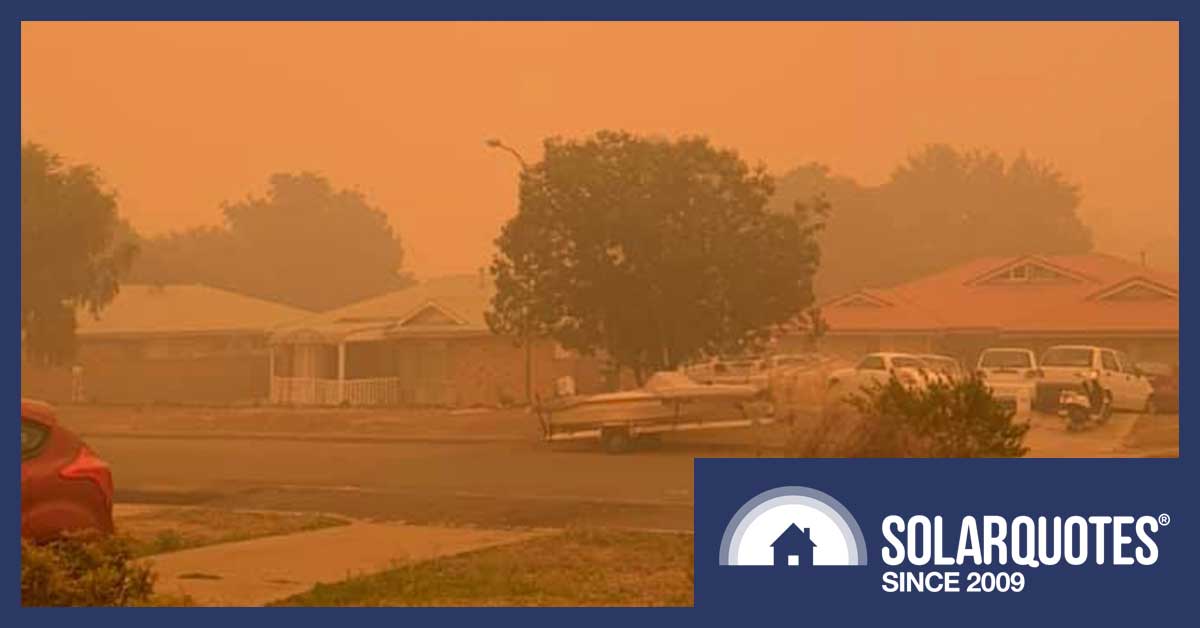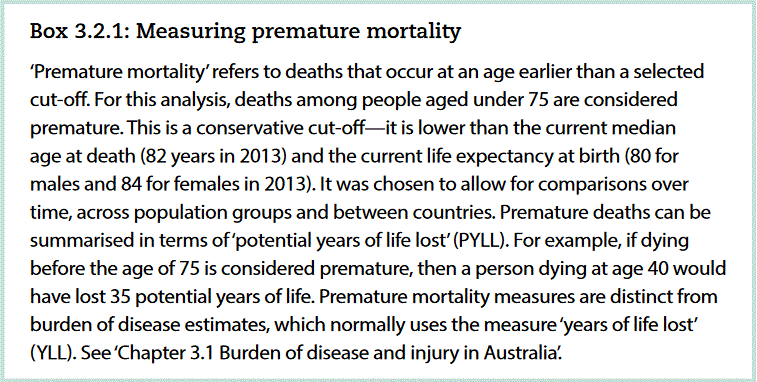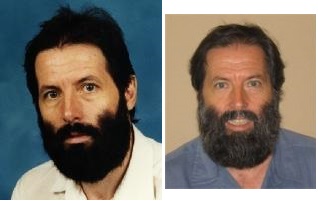
Wagga Wagga yesterday. So smokey you can’t even make out a single Wagga.
According to UQ Economics Professor, John Quiggin, Australia is likely to suffer 1,000 or more excess deaths due to smoke pollution from the current disastrous bushfire season. He wrote about it here. If you want the details check out the article, it’s only 860 words. But the quick and dirty summary is:
- Smoke is particulate pollution.
- Particulate levels are directly related to illness and death.
- We have measurements on how much the bushfires increased particulate levels and how many were exposed.
- Therefore, Quiggin can estimate how many excess deaths are likely to occur.
This means the tragic true death toll of this bushfire season may be more than 50 times greater than the 22 direct deaths I’m currently aware of.
Definitions For Quiggin’s Highfalutin Terms
Despite being a Professor, Quiggin writes pretty clearly. However, he does sling around a few fancy words that I, being at the sub-professor level, had to look up. Just in case this is something you might need to do I’ll tell you what I learned to save you time and effort:
Excess deaths: This is pretty straight forward. It just means more people dying than you’d otherwise expect. The World Health Organization’s glossary defines it as:
Premature mortality: If you are wondering what mortality is I went and got the Australian definition of premature mortality from this report by the Australian Institute of Health and Welfare. Basically, if someone dies under the age of 75 it is a premature death or premature mortality:
I also looked up the Finnish definition of premature death for the benefit of my boss, Finn, and it is a state that occurs whenever they don’t get their morning litre of coffee.
Probably Not Lies Or Damned Lies
What isn’t given by Quiggin in the article is an estimate of the total years of life lost. I would expect the excess deaths to be concentrated among the elderly, those in poor health, smokers, etc.
Because it’s the weak who usually die from air pollution, maybe they would have died soon anyway and so not many years of life in total will be lost from the expected 1,000+ excess deaths. But I’m not sure it works that way. Granny might have a health crisis when she’s 70 and be so close to Death’s door he trips over her on his way to a Loy Yang Power Station board meeting, but if she pulls through she might be good for another 10 years. And 10 years is a long time compared to no more time.
I suspect each excess death represents multiple lost years and the bushfire smoke pollution will result in at least several thousand years of Australian lives lost. But I don’t actually know. This is just my guess. I’m not an epidemiologist. I need to kill a few more people before I qualify for my honorary degree in that.
I Think Quiggin Is On The Ball
Quiggin is an Economics Professor at the University of Queensland and he explains his reasoning pretty well, so I think he — regrettably — isn’t likely to be wrong in his estimate of excess deaths. But the main reason I trust him is not because of his qualifications or because he wrote a book on zombies. It’s because he’s an awesome Ned Kelly cosplayer:
Unfortunately, I’ve heard he’s shaved and apparently the Quigster now looks like this:

Image: Australian National Univesity
As his power remains undiminished, I can only assume he kept his beard after shaving it off. My guess is he keeps it in a glass case and occasionally takes it out and strokes it when in need of deep economic insights.
Even without the beard he doesn’t look too shabby for someone in his 60s. Apparently, he still does triathlons – or dieathlons, as I call them — so he’s clearly just as nutty about exercise as my boss. If only he was still bearded. Then he’d be like an unstoppable combination of my facial hair and Finn’s endurance.
Serious note: If you or your family are exposed to bushfire smoke – limit your exposure as much as possible. When exposed wear a properly fitted P2 mask. To improve the air quality in your home – invest in an air purifier and please read this excellent article by Choice.




 RSS - Posts
RSS - Posts



“To improve the air quality in your home – invest in an air purifier and please read this excellent article by Choice.”
Thanks for this link, Ron. With four fireplaces, it’s very relevant to us… .
Our problem is only temporary and it doesn’t seem to be a problem that worries the govt. in the manufacturing cities of China or Indonesia or reportedly reduced the population by much. I don’t think we are going to see a govt. issue of face masks.
“Our problem is only temporary…”
EDIT: Let’s try not to be in too much of a hurry to jump down each other’s throats. It’s unsanitary. Wait until someone says there’s no such thing as global warming or something, then you can do all the throat jumping you like. I like to give people the benefit of the doubt, right up until they abuse it.
Yes, you’re right.
We need to manage this temporary problem we’re having with climate change.
My anger is misplaced… .
That may not be what he is saying. Principle of charity and all.
When our smoke clouds are afflicting New Zealand, they’re hard to dodge here. My 87 y.o. mother wasn’t coping with the smoke in Stratford, 50 km west of Bairnsdale, and evacuated to Melbourne. It is ironic to be hiding from smoke in the Big Smoke.
I think it’s the old and the young who are most susceptible. It’s well worth taking seriously. (Especially if you’re too old to count on the statistician’s graph.)
Ronald,
After reading Professor Quiqqin’s article I truly feel that in your attempt to be humourous (which I always appreciate btw), you’ve left out some very significant points he made, and I suggest that those who haven’t done so already should read the full article.
I will pick-up on a couple of those points:. He writes: ‘At a MINIMUM, we need a standing national body, with substantial resources, ready to respond to such disasters as they occur. This would almost certainly wipe out the Morrison government’s treasured surplus,’
I will add to that. State Governments are also going to be picking up a significant portion which may well wipe out or reduce any surpluses they have. Insurance companies will be picking up some of it too
Professor H also says: ‘Even worse than budget fetishism has been the cultural commitment of the government to climate denialism and do-nothingism. The right’s commentariat peddles anti-science nonsense on a par with anti-vaxxerism and flat-earth cosmology, eagerly lapped up by the mostly elderly readership of the conservative press. The government can’t endorse this nonsense officially, so it takes refuge in the idea that Australia accounts for only a small proportion of total emissions :
One thing that’s missing from your post are mention of the social impacts. We don’t fully know yet how many people and their family residences es will be directly affected, as the current fires haven’t been put out yet and more fires are expected.
But its likely to be in the 10’s of thousands. Many of those families were already on ‘struggle street’ – mortgage and loan arrears, house re-possessions, savings in bank accounts already gone and now on welfare (through no individual fault of their own) because of no jobs etc – BEFORE this disaster occurred due to drought effects.
If we do get some heavy rain, there’ll be some significant run-off of ash and various toxic residues mixed with decaying animal parts into rivers and streams, which will affect water supplies and aquifers, including those of Sydney itself.
Ash and smoke from the fires has already traveled 2000 km West and reached New Zealand, turning the Fox and Franz Josef glaciers brown as well as blocking out the sun. That was on the 3rd of January and it takes roughly 2 days to travel the distance, so that was the position in NZ around the 1st of January. A great New Years present to our ‘cousins’, with even larger bonus gifts to follow. On Sunday, the sky over Auckland and Northland was a rather gloomy and ominous orange and people with asthma have reported effects. ‘Solidarity’ has its limits and doesn’t stretch to choking to death to show your friendship
So.. In Australia – tourism influx vanished, unlikely to be seen again for a while, massive ‘fix up’ costs about to be spent with more to follow, coal exports trending down, mining royalty flow vanishing fast, light manufacturing and retail stores closing down as consumer spending diminishes, tax and GST revenues also declining in line.
Could things get worse? Well yes they could. The sea levels are still rising, the economic effects of massive pollution in other countries are still finding their way here, extreme weather events still abound with their flow-ons. So even if the magnitude of fires declines next year (as seems very likely), there’ll be lots of other stuff around for the government to show their prowess at problem solving.
Here’s an article from ‘Oil and Gas Australia’ https://www.oilandgasaustralia.com.au/study-forecasts-boost-asia-pacific-oil-gas-investments/
They state:
‘CONFIDENCE in the outlook for Asia Pacific’s oil and gas industry has more than doubled in the past two years, according to new research published by DNV GL’ .
They expect to invest more, and recruit more staff.
Over in Canada, there’s a somewhat different outlook. To quote from ‘Global News Canda’, a Dec 2019 article here: https://globalnews.ca/news/6174247/federal-bailout-oil-and-gas-alberta/ advises that:
‘Canada’s $1.6-billion bailout for Alberta’s battered oil industry is well underway, but with little transparency about who is getting the money and for what.’
and ‘ European banks flee the sector altogether.’ ( the fossil fuel sector)
and ‘Canada’s energy industry is reeling from the departure of massive amounts of capital, with $30 billion divested in the last three years, even as global demand for oil is forecast to grow.
Is current government leadership really to blame?
It clearly seems so:
To quote from an October 2019 ABC article found here: https://www.abc.net.au/news/2019-10-04/the-bushfires-of-the-future-are-here-black-swan/11559930
‘Two years ago, the NAFC ( National Aerial Firefighting Centre) sent a proposal on behalf of all states and territories to Canberra for an annual increase of $11 million above its existing $15 million funding, which would contribute to contracting large water-bombing aircraft from countries such as the US.
They still haven’t received a decision from the Federal Government.
Background Briefing has obtained documents that show the proportion of federal funding for NAFC ( National Aerial Firefighting Centre) has more than halved since 2003.’
That’s just one example
Efforts from the ‘extreme right’ to ‘blame the Greens’ are escalating as are their efforts to gain credence with various Evangelical groups and congregations, many of whom view Donald Trump quite favourably.
It seems to me the stage is somewhat set for the following economic scenario
‘Fix-up’ costs relating to our existing situation will continue to rise somewhat exponentially, because – in effect – we will always be constantly doing a ‘delayed’ catch-up in relation to the past, not spending the extra thats needed to reduce or remove those ‘fix-up’ costs. To use some proverbs that have been around for centuries – ‘A stitch in time saves nine’ and ‘an ounce of prevention is worth a pound of cure’.
To use another analogy, the argument of ‘insignificance’ is used by climate denialists in relation to CO2 levels of .04% in the atmosphere. If you accept as truth the logic that insignificance in size or quantity of ‘something’ also means it has insignificance in its effect, I would pose the following question?
Does that mean I can pour 4 litres of cyanide into my 10,000 litre drinking water tank and happily drink it over the next year or so? Or if my doctor tells me that .04% of my body mass consists of bubonic plague germs I have absolutely no need at all to be worried about it?
Des Scahill,
You state:
“I will add to that. State Governments are also going to be picking up a significant portion which may well wipe out or reduce any surpluses they have. Insurance companies will be picking up some of it too”
Ebony Bennett, Deputy Director of The Australia Institute says:
“Regular Australians should not be forced to pay while fossil fuel producers are being let off scot-free”
See: https://www.tai.org.au/content/morrison-government-s-fire-response-should-be-funded-levy-fossil-fuel-producers-australia
Will fossil fuel producers continue to be let off scot-free? Whilst ScoMo (and other key government ministries) continue to be advised by senior staff and members of his government that are dominated by former executives and employees of the coal industry, and its lobbyists, I doubt it.
See: https://www.greenpeace.org.au/news/greenpeace-exposes-murky-influence-network-that-entrenches-coals-power-over-liberal-and-national-parties/
See also: https://www.michaelwest.com.au/who-pays-should-ordinary-taxpayers-foot-the-bill-for-bushfires-or-the-fossil-fuel-giants-who-pay-no-tax/
Is it possible to have a discussion about Climate Change without immediately declaring that those who have a less radical view must be deniers or flat earthers or, worse, conservatives?! I think Climate Change is real but I am also cautious about embracing everything written about what causes it and what we should be doing about it. To try and give myself a better understanding I read articles from the Left and the Right and every now and again, from someone independant. And I must say the latter is becoming increasingly hard to find! Because of this Mr Quiggin describes me as being one of those elderly readers lapping up the conservative press. We should have learnt from Mao’s 1966 Cultural Revolution that it’s not always wide to toss out everything from the old and replace with the new! And Mr Quiggin you should learn not to make such broad assumptions…cheers
So do I!! –> ” I read articles from the Left and the Right “. I’m a Conservative Jew.
But do tell, how does one read articles in de pendent?…..(strange way to spell ‘dunny’).
CHRIS SOUTER,
You state:
“I think Climate Change is real but I am also cautious about embracing everything written about what causes it and what we should be doing about it.”
The first question I would ask is: Chris, where are you sourcing your information from?
You then state:
“To try and give myself a better understanding I read articles from the Left and the Right and every now and again, from someone independant. [sic] And I must say the latter is becoming increasingly hard to find!”
IMO, there’s your problem, Chris. Climate science is not a Left, Centre, Right, or anywhere on the political spectrum.
Science is apolitical – it is based on a large body of evidence accumulated over time all pointing in the same direction. Climate science is an accumulation of a large body of evidence over multiple lines of inquiry in many fields of study all pointing in the same direction.
Whether we like it or not, the Laws of Physics ‘govern’ how the universe we live in behaves, and doesn’t ‘care’ what your (or anyone’s) politics, ideology or beliefs are – it will do what it has done since the “Big Bang” and continue to do so long after we are all long dead. Humanity must work within these rigid and unyielding constraints, or we are kidding ourselves – this is not a movie or computer game; it’s real life with no reset/replay!
Politics comes into play only when we decide to act (or not act) and how we choose to act in response to the scientific information.
IMO, presently it seems we (as a species) are not effectively acting in response to the escalating dangerous consequences of human-induced climate change, and the compelling scientific evidence indicates that with the current trajectory of human-induced GHG emissions, humanity risks civilization collapse and a large reduction in human population (i.e. down to less than 1 billion) within this century.
So, it seems to me, we (as a species) have a political choice: Do we choose to deal with the escalating problem as best we can (and that means everyone on planet Earth cooperatively acting), or continue to remain in denial, fail to act collectively and cooperatively, and suffer the likely escalating dire consequences (as the scientific evidence indicates) over the next few decades? That’s the deal!
My advice is to first look for information coming from scientists directly involved in the study of climate science. Avoid articles that likely reinterpret/distort the scientific information through an ideological perspective projecting propaganda that supports vested interests.
To be better informed and as a starter, I’d suggest you view the YouTube video (see below) that includes (a leading climate scientist) Professor H. J. Schellnhuber’s address presented on 17 Oct 2018, from time interval 0:05:31 through 0:40:20 (as an example of where climate science is currently, beyond the latest IPCC report).
IMO, although not a climate scientist but is a science-based engineer, Ian Dunlop’s presentation titled “Climate Emergency Plan & Collective Action: Reframing Climate Change as an Immediate Existential Risk”, is also worth a look, from time interval 1:32:57 through to 1:42:21.
For what it’s worth, you may wish to look at my Submission (#215 & #215a) to the NSW Parliament Legislative Assembly Standing Committee on Environment and Planning Inquiry into sustainability of energy supply and resources in NSW, outlining some of the climate and energy security challenges I see facing us, and some likely solutions.
See: https://www.parliament.nsw.gov.au/committees/inquiries/Pages/inquiry-details.aspx?pk=2542#tab-submissions
Chris, perhaps there’s an opportunity here for you to be more widely informed than allegedly being described “as being one of those elderly readers lapping up the conservative press”? In this age of information, ignorance is a choice.
[Keynote Debate Can the Climate Emergency Action Plan lead to Collective Action_ (50 Years CoR)]
Quite right Young Ron! The Professorial gobbledegook needs to be considered in the light of Reality! –> “It just means more people dying than you’d otherwise expect.”
Ever since I discovered that EVERYONE who ate bananas in 1864 died, I’ve always “expected” that it’s not possible to underestimate the number of deaths. Nor overestimate it.
Hi Jackson,
What exactly is your point Jackson? It seems to me that your reasoning is: ‘Because we are all going to die anyway, why worry about when that happens or why?’
I’ll concede its a novel justification for doing nothing at all in regards to just about everything and could well form the basis of a catchy new election slogan for the Liberal Party eg. ‘Do Nothing. Die Happy’.
CHRIS SOUTER
While Geoff’s advice is sound, it can be hard in the beginning to bring all the bits and pieces together, relate those to what’s happening around us and form a view that is science and fact based.
Two websites that are extremely helpful are:
https://climatecrocks.com/ – this website focuses on ‘debunking’ the more current of the latest ‘climate change denialist’ myths circulating at any one time, and usually gives details of the organisations or people circulating those along with factual news reports from the media, reputable scientific and academic sources, and government departments which completely debunk their claims.
and https://www.snopes.com/
Snopes, which has been around for quite a long time covers a far wider field than ClimateCrock and has a world-wide reputation for the quality of its work – If you want to know (say) ‘Were members of the Trump family banned from running charities in New York because they reportedly stole from a children’s cancer charity.’ Snopes has the answer. It does have some further ‘climate change denialism’ items that ‘climatecrock doesn’t mention.
You can also find a very comprehensive list of fact checking websites here:
https://en.wikipedia.org/wiki/List_of_fact-checking_websites
Some of the stuff that gets circulated in various countries and accepted by many is unbelievable.
The ‘denialist’ sector is often closely associated with the more extremist right wing political movements, who use ‘denialism’, ‘conspiracy theories’ and anything else they can think of as a means of casting ‘doubt’.
The political aim is to cause the general public to – over time – lose their trust in the various institutions and political mechanisms that are fundamental to the continuation of a democratic society, and look for another alternative form of government that replaces those completely. The alternative they offer is ‘Populism’, rather than agitating for needed change using already existing mechanisms and that invariably leads to a Totalitarian society.
Winston Churchill famously said. ‘Democracy is the worst form of government. But it is better than all of the alternatives. ‘ He was right.
Sure, you might from time to time vote in a bunch of loonies, but at least you get a chance to vote them out again before they do too much damage.
Fact Check, Fact Check, Fact Check, Fact Check – is the name of the game these days, for just about everything.